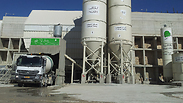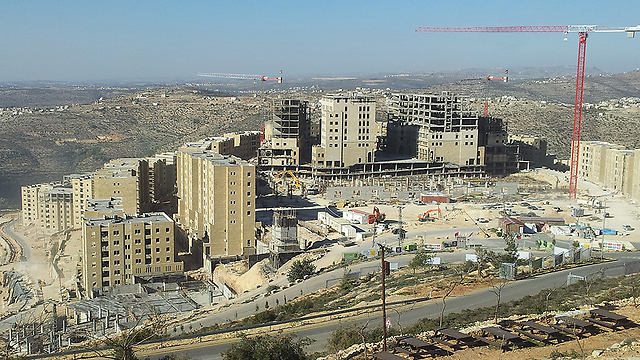
A model of peace: Rawabi entrepreneur insisted on buying the materials for his project from Israel
Rawabi's dried-up pipe could land Israel in deep water
Op-ed: There are quite a few ways to explain to the world why uninvolved people were killed in Gaza or why Jews are allowed to settle in an occupied territory; but there is no way to explain why Israel is preventing a Palestinian city from receiving water.
In a few weeks' time, we'll sit around the Seder table and recount the Exodus from Egypt, and the more the merrier.

We will recount how Moses went to Pharaoh, the king of Egypt, and called on him: Let my people go. But God hardened Pharaoh's heart, and Pharaoh refused. God hit Egypt with nine horrible plagues, and each time the frightened king accepted the demand, and then, when the punishment was called off, he went back on his word and refused. He only let them go after the 10th plague, death of firstborn.
And now let's put the Bible stories aside and focus on settling the country. North of Ramallah, near the Ateret settlement, a city is being built. Its name is Rawabi. The diligent reader likely remembers press reports about the progress in the city's construction, newspaper reports which stretched over two pages and long television and radio reports.
I wrote about it quite a lot myself. I thought that the project marked the Palestinians' shift from sanctifying terror to normalization, and the huge importance of this move for the State of Israel requires no explanation.
I traveled there. I was impressed by the multi-story buildings being constructed in Area A, by the quality of the urban planning which followed in the footsteps of the Israeli city of Modiin, by the enviable prices starting at $80,000 for a four-room apartment, by the quality of construction, by the marketing method. I interviewed the entrepreneur, Bashar al-Masri, who insisted on buying the materials for his project from Israel of all places, despite the Palestinian Authority's boycott declarations.

Rawabi. The complete opposite of Hamas' Gaza: A bourgeois, well kept, demilitarized island, free of politics
The first stage of the project was completed last May. The buyers were supposed to receive the keys. The keys were not delivered. The construction company couldn't house the buyers because there was no water flowing out of the taps in their apartments. The water didn’t flow because Israel refused to connect them to the joint pipe. Israel refused to connect them because its government is involved in a conflict with the Palestinian Authority.
Each side in this conflict has principles: The PA won't sign on water supply to the settlements; our government won't approve water for the Palestinians as long as the PA won't sign.
In the meantime, the city's construction work has been halted. The marketing has been stopped too. The project, which was partly funded by Qatari money and partly by the buyers' money, is stuck. It will soon reach the courts.
The damage suffered by the investors is unfortunate, but what we should be interested in is the damage to the State of Israel. There are quite a few ways to explain to the world why uninvolved people were killed during Operation Protective Edge in Gaza. There are even ways to explain why Israel insists on letting Jews settle in an occupied territory. There is no way to explain why Israel is preventing a Palestinian city from receiving water. All the more so when Rawabi is the complete opposite of Hamas' Gaza: It's a bourgeois, well kept, demilitarized island, free of politics. It’s the model of peace according to the West's perception.
The PA, which is looking for issues to use in the "diplomatic intifada" it is waging against Israel, has enthusiastically jumped on Rawabi: In this case, water is thicker than blood. And there are already colleges in the United States and Europe in which anti-Israel activists are going on about the city which was not joined together, the Palestinian thirst and the Israeli pharaoh. The dried up pipe will serve as an excellent propaganda tool.
Major-General Yoav Mordechai, the coordinator of government activities in the territories, has made a huge effort in recent month to push the problem off the agenda. He used his connections in the PA to pave the way to a compromise. When he realized salvation will not come from there, he convinced Defense Minister Moshe Ya'alon to support a one-sided connection of the city. That's how quite a few settlements were connected to a water supply system.
Ya'alon mulled over the issue quite a lot. It's possible that he thought about the primary elections, and about how Likud members in the hardcore settlements would vote. He eventually decided that the pipe should be connected. According to rumors, Prime Minister Benjamin Netanyahu is also in favor of connecting the pipe. He realizes that Rawabi is a ticking bomb, both from the PR and legal aspects.
Until the matter reached Silvan Shalom's desk. Shalom is the minister of energy and water. When it comes to the West Bank area, the authority belongs to the Central Command chief, and in fact to the defense minister. The defense minister is in charge of the pipe, but the water minister is in charge of the water. Mekorot, Israel's national water company, will not supply water without the Water Authority's approval, and the Water Authority will not give the approval if the water minister refuses.
We have a prime minister who can launch a war on Iran or fire the Israel Prize for Literature's panel of judges, but doesn't know how to turn on the tap to Rawabi. Or perhaps he does know, but doesn’t want to do it while fighting with Naftali Bennett and Baruch Marzel over the right-wing votes. And we have a defense minister with good intentions who is incapable of acting.
We survived Pharaoh, Israeli singer-songwriter Meir Ariel sang. We'll survive this too.










